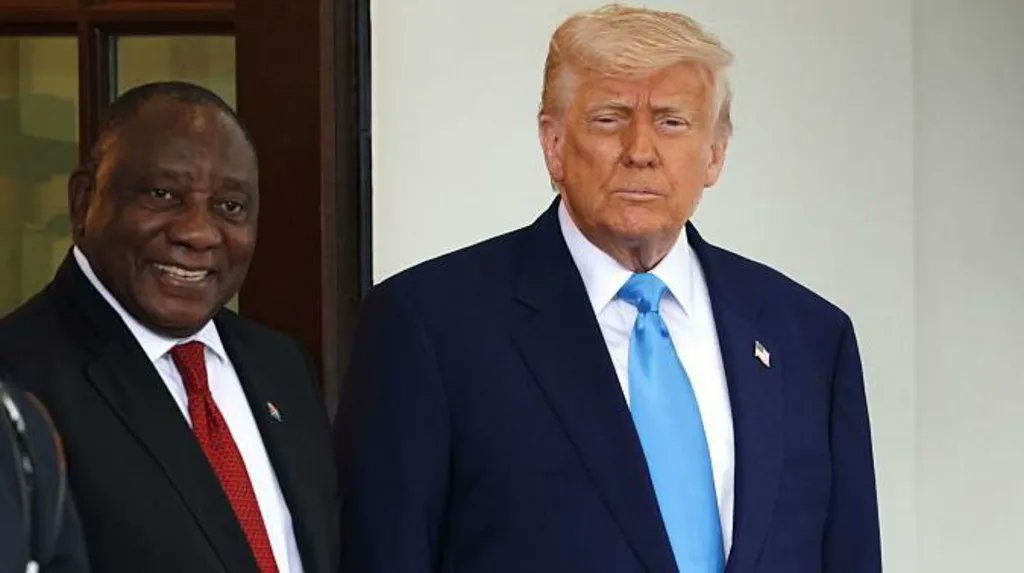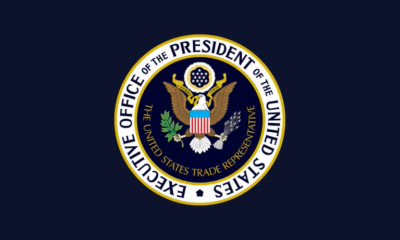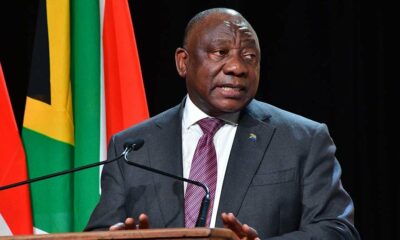Business
Tariff Turmoil: South Africa Rallies to Protect Exporters from Trump’s 30% Blow

As Trump slaps South Africa with a 30% tariff, Pretoria scrambles to protect jobs, industries, and a fragile trade balance.
A diplomatic chill is turning into an economic freeze for South Africa, after U.S. President Donald Trump signed an executive order triggering 30% tariffs on a wide range of imports, including key South African goods like citrus, wine, steel and vehicles.
The response in South Africa was swift and tense. Government ministers are now rushing to plug a potentially massive leak in the country’s trade pipeline. And with jobs, exports, and international relationships hanging in the balance, Pretoria has entered what it’s calling “emergency mode.”
The Export Lifeline: Government’s Rapid Response
Trade and Industry Minister Parks Tau announced that the Department of Trade, Industry and Competition (DTIC) is establishing an “Export Support Desk” a task force aimed at helping businesses navigate the immediate fallout, explore new markets, and find alternative trading partners.
“This is a trying moment for South Africa,” Tau said in a press briefing, underlining the risk to thousands of jobs in both the agricultural and automotive sectors, two industries that have enjoyed preferential U.S. trade access until now.
President Cyril Ramaphosa confirmed that government is finalising a support package to help businesses absorb the shock. “All channels of communication remain open,” he said, adding that South Africa is ready to negotiate, if Washington is willing to pick up the phone.
Why This Tariff Matters (and Hurts)
The United States is South Africa’s second-largest trade partner, after China. Billions of rands in goods flow across the Atlantic each year, with South African cars, oranges, wine, and steel topping the list.
But Trump’s tariff, part of a sweeping effort to reassert U.S. dominance in global trade, puts a price tag on that relationship. South African exporters now face huge cost increases when selling into the American market, a market that, for many smaller producers, was the golden ticket.
And it’s not just about numbers. The move is seen by some as a political warning shot too, coming after months of tensions over South Africa’s stance on global conflicts and its affirmative action laws, both of which the Trump administration has openly criticised.
Pretoria’s Failed Overtures and Trump’s Cold Shoulder
According to sources close to the negotiation efforts, South Africa had already spent months trying to smooth things over. Reports suggest that Pretoria offered a deal: buy more U.S. natural gas, invest in American manufacturing, and increase bilateral economic cooperation.
Washington reportedly ignored the overtures.
The result? South Africa now joins dozens of countries slapped with tariffs in Trump’s sweeping trade overhaul — and becomes another example of how Africa’s voice is still overlooked in global economic power plays.
Mixed Reaction at Home: Emergency Desk or Emergency PR?
The Export Support Desk has been met with divided reaction locally.
While business chambers and exporters welcomed the quick action, opposition leaders were far from impressed. The Democratic Alliance called the initiative “laughable,” claiming that band-aid responses won’t stop economic bleeding.
Social media has also lit up with frustration. On X (formerly Twitter), hashtags like #TariffTrouble and #SupportLocalExporters are trending. One user quipped, “A support desk won’t save our citrus,” while another called on South Africa to “stop begging and start building alliances elsewhere.”
A Bigger Conversation: Rethinking Trade Beyond the West
This crisis has reignited calls for regional cooperation and market diversification.
Analysts say it’s time South Africa stops being so reliant on markets like the U.S. and EU. The African Continental Free Trade Area (AfCFTA), BRICS, and stronger ties with Asia and the Middle East are now seen as more important than ever.
“South Africa can’t afford to be caught flat-footed again,” said an economist at Wits University. “This tariff should be a wake-up call to rethink who we’re trading with and why.”
What’s Next for Exporters?
With the tariff set to take effect in less than a week, local exporters are in panic mode. Many are calculating losses, postponing shipments, and rushing to find buyers in Europe, Asia, or across Africa.
Meanwhile, all eyes are on Pretoria’s promised support package. Will it be substantial enough to make a difference, or just a temporary cushion for what may be a long-term realignment in global trade?
One thing’s for sure: the economic weather is changing fast. And South Africa’s exporters already weathering high costs, load shedding, and currency volatility, are now caught in a storm not of their making.
{Source: Business Insider Africa}
Follow Joburg ETC on Facebook, Twitter , TikTok and Instagram
For more News in Johannesburg, visit joburgetc.com



























